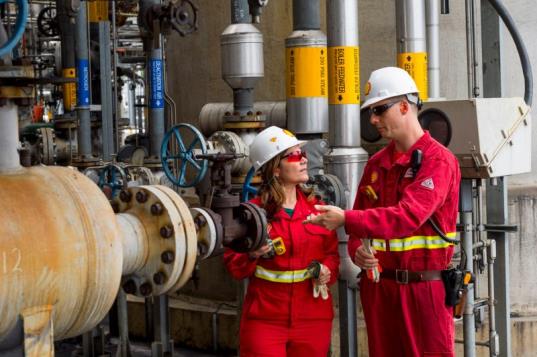

This course focuses on the introduction to pipeline engineering, codes standards and regulations, basic pipeline materials and corrosion control, pipeline design and hydraulic analysis, and pipeline integrity management.
By the end of this course delegates will be able to:
•Gain an in-depth knowledge of pipe and fitting material specifications, manufacturing, fabrication process and their influence on mechanical properties of strength and toughness, to help in material selection and failure analysis
•Understand the technical background to the design formulas, and their application to the design of piping systems and pipelines
•Gain a practical understanding of piping and pipeline mode of failure, corrosion mechanisms, how to recognize them, classify them and resolve them
•Learn risk assessment for piping & pipeline i.e. probability of failure and their consequences if failures occur
Pipeline, Piping & Plant engineers in mechanical reliability programs, structure integrity, plant inspectors, central engineering staff, and consultants for refining and petrochemicals
Introduction to Pipeline Engineering
•History of Pipeline Technology
•ASME Codes and Standards
•API Standards
•NACA, MSS-SP
•PFI Standards
•Fundamentals of Maintenance and Integrity
Materials Selection
Welding Practice
•Overview of Pipe and Pipeline Welding Practice
•API 1104 and ASME IX Requirement
•Welding in-service
Strength Integrity for Sustained Loads
•Operating and Design Pressure
•System Design Pressure
•Introduction to Pressure Relief Valves
•Pipe and Pipeline Sizing Formula with Applications & rules of good layout
•Pump and Compressor Piping
•How to Support a piping System
•Review of Support Types and their Application
•Lesson learned from Poor Support Practices
•Temperature Effects
•Flexibility Layout Analysis
•Temperature Transients and Fatigue Damage
•Vibration in Service
•Mechanical and Hydraulic Induced Vibration in Piping
•How to Measure Analyse Resolve Vibration
Strength Integrity for Occasional Loads
•Pressure Transients
•Recognizing and Solving Liquid Hammer
•Pump Station Transients
•Study of Pipeline Failures Due to Transient
•Two-Phase Liquid
•Vapor Transients
•Two-Phase Liquid-Gas Transients
•Gas Discharge Transients
•Buried Pipe
•Soil Loads
•Surface Loads
•Expansion of Buried Pipe
•Soil settlement, n-service Movement of Pipeline
•Pipeline Failures
•Understanding Why Failures Occur Avoiding them
Corrosion Assessment and Protection
•Introduction to Practical Corrosion
•Corrosion Mechanisms
•General Wall Thinning
•Local Corrosion
•Galvanic Effects
•Crevice Corrosion
•Pitting Corrosion
•Environmental Effects
•Hydrogen and H2S Effects
•Microbiological Corrosion
•Corrosion Protection
•Cathodic Protection Overview
Risk Assessment Overview
•Introduction to risk assessment
•Risk Criteria
•Probability of failure
•Third party damage
•Corrosion aspects
•Design aspects
•Incorrect operation
•Consequence of failure
•Product hazard
•Spill assessment
•Dispersion calculation
•Receptors
•Risk Representation
Maintenance & Repair
•Flange and Mechanical Joints
•Overview of Different Types of Flanges and Application
•Causes of Flange Leaks and How to Resolve
•Assembly of Flange Joints and Leak Tightness
•Pressure and Leak Testing
•The Difference Between Leak Testing and Pressure Testing
•Review of Difference Testing Techniques
•The Purpose of Hydro test
•How to Conduct a Hydro test
•Pipeline and Piping Systems Testing
•Pneumatic Testing
•Repair Techniques
•The New ASME Repair Standards
•The Fundamentals of Repair package
•Pipe and Component Replacement
•Grinding and welding
•Welded Sleeve: Type A and B
CDGA attendance certificate will be issued to all attendees completing minimum of 80% of the total course duration.
| Code | Date | Venue | Fees | Register |
|---|---|---|---|---|
| ME180-02 | 17-05-2026 | Dubai | USD 5450 | |
| ME180-03 | 23-08-2026 | Amman | USD 5450 | |
| ME180-04 | 20-12-2026 | Doha | USD 5450 |
Providing services with a high quality that are satisfying the requirements
Appling the specifications and legalizations to ensure the quality of service.
Best utilization of resources for continually improving the business activities.
CDGA keen to selects highly technical instructors based on professional field experience
Since CDGA was established, it considered a training partner for world class oil & gas institution
3012, Block 3, 30 Euro Business Park, Little Island, Co. Cork, T45 V220, Ireland
Mon to Fri 09:00 AM to 06:00 PM
Contact Us anytime!
Request Info